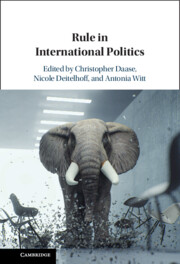Book contents
- Rule in International Politics
- Rule in International Politics
- Copyright page
- Contents
- Contributors
- Acknowledgements
- Introduction
- Part I Theorizing Rule
- 2 Authority in International Relations
- 3 Ruling the World
- 4 Anarchy, Authority, Rule: Reconsidered
- Part II Practicing Rule
- Part III Resisting Rule
- Index
- References
3 - Ruling the World
Organizational Ecology and Bias in Global Governance
from Part I - Theorizing Rule
Published online by Cambridge University Press: 15 June 2023
- Rule in International Politics
- Rule in International Politics
- Copyright page
- Contents
- Contributors
- Acknowledgements
- Introduction
- Part I Theorizing Rule
- 2 Authority in International Relations
- 3 Ruling the World
- 4 Anarchy, Authority, Rule: Reconsidered
- Part II Practicing Rule
- Part III Resisting Rule
- Index
- References
Summary
The ecology of governance organizations (GOs) matters for what is or is not ruled. The array of actors who comprise the current system of global governance, and especially private governance organizations (PGOs), has grown dramatically in recent decades. Drawing on organizational ecology, I posit that the rise of PGOs is both required and facilitated by disagreements between states that block the creation of what might be otherwise effective intergovernmental organizations (IGOs). In a form of “double-negative regulation,” states block IGOs which in turn leave open niches that are then filled by PGOs, which then both complement and sometimes substitute for state law. The organizational ecology approach outlined here extends and refocuses inquiry in systematic ways that give us a fuller understanding of how and why PGOs have emerged as one of the most striking features of the contemporary world order. The key innovations in this paper are to a) shift the level of analysis from single agents or populations of agents to the entire field of GOs, including states, IGOs, and PGOs and b) draw on principles of ecology to understand the composition and dynamics of systems of governance.
Keywords
- Type
- Chapter
- Information
- Rule in International Politics , pp. 61 - 86Publisher: Cambridge University PressPrint publication year: 2023



